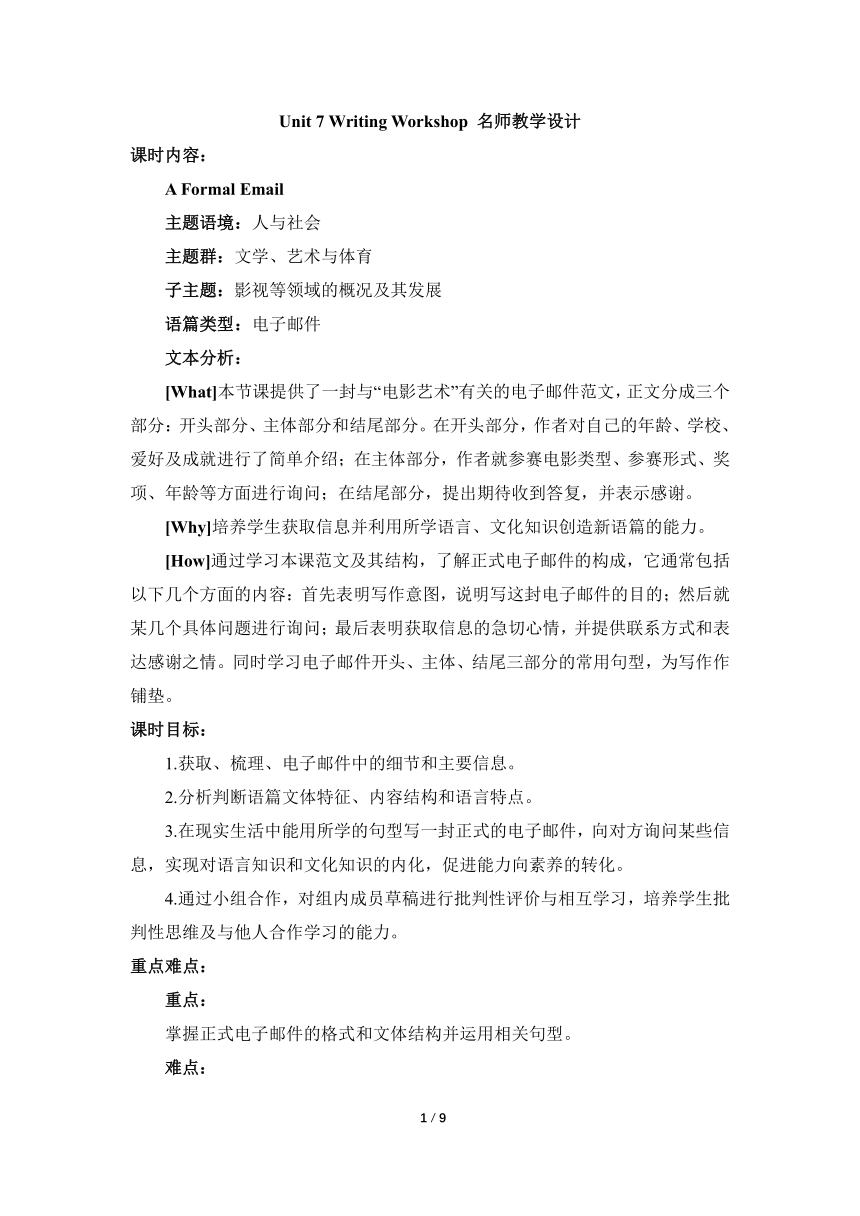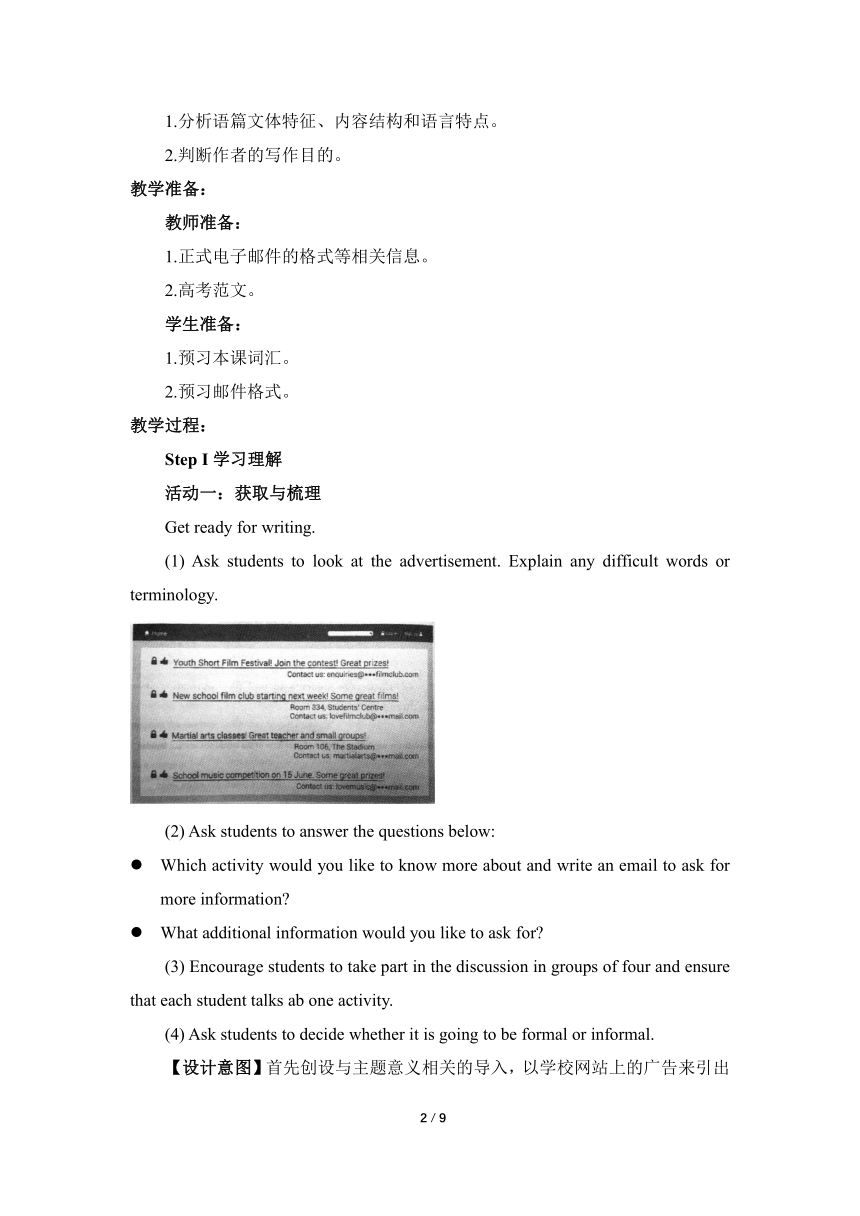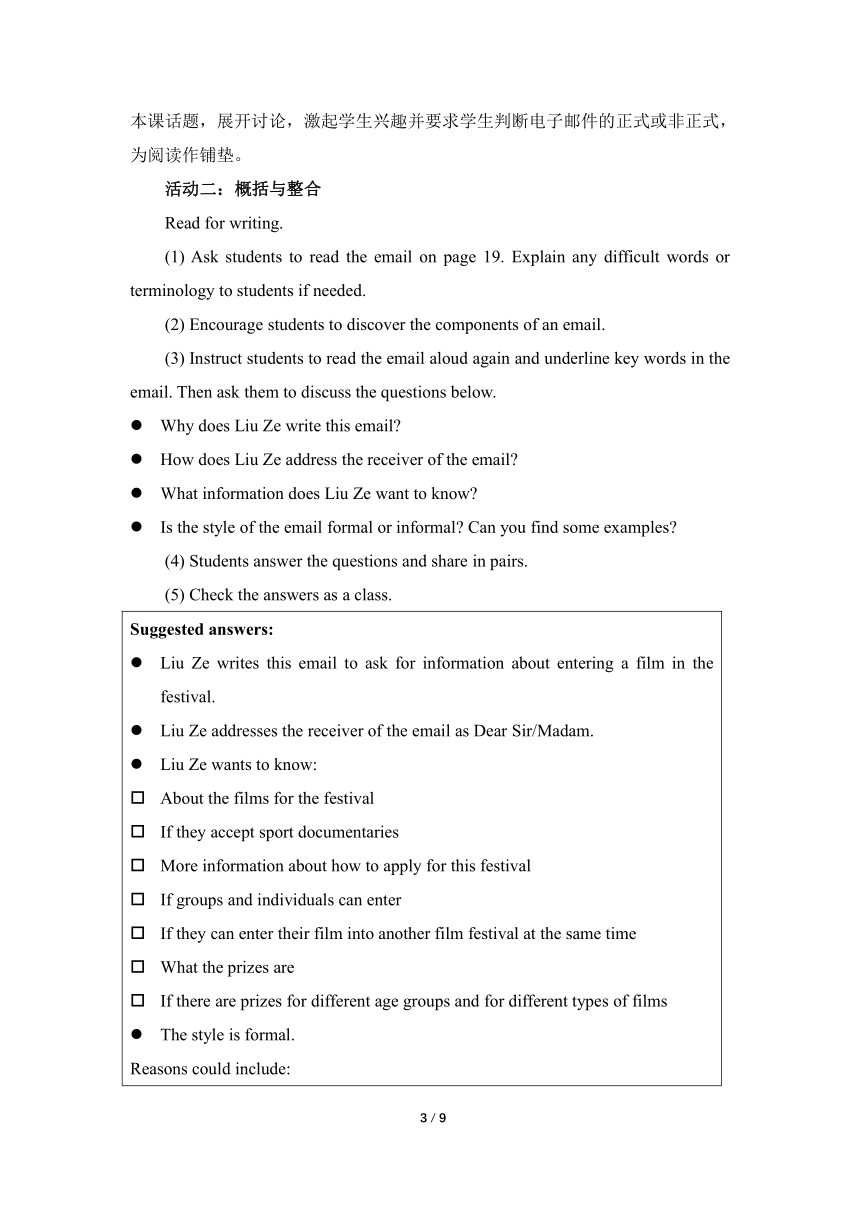北师大版(2019)必修 第三册Unit 7 Art Writing workshop名师教学设计
文档属性
| 名称 | 北师大版(2019)必修 第三册Unit 7 Art Writing workshop名师教学设计 |

|
|
| 格式 | docx | ||
| 文件大小 | 358.2KB | ||
| 资源类型 | 教案 | ||
| 版本资源 | 北师大版(2019) | ||
| 科目 | 英语 | ||
| 更新时间 | 2023-03-07 21:16:59 | ||
图片预览




文档简介
Unit 7 Writing Workshop 名师教学设计
课时内容:
A Formal Email
主题语境:人与社会
主题群:文学、艺术与体育
子主题:影视等领域的概况及其发展
语篇类型:电子邮件
文本分析:
[What]本节课提供了一封与“电影艺术”有关的电子邮件范文,正文分成三个部分:开头部分、主体部分和结尾部分。在开头部分,作者对自己的年龄、学校、爱好及成就进行了简单介绍;在主体部分,作者就参赛电影类型、参赛形式、奖项、年龄等方面进行询问;在结尾部分,提出期待收到答复,并表示感谢。
[Why]培养学生获取信息并利用所学语言、文化知识创造新语篇的能力。
[How]通过学习本课范文及其结构,了解正式电子邮件的构成,它通常包括以下几个方面的内容:首先表明写作意图,说明写这封电子邮件的目的;然后就某几个具体问题进行询问;最后表明获取信息的急切心情,并提供联系方式和表达感谢之情。同时学习电子邮件开头、主体、结尾三部分的常用句型,为写作作铺垫。
课时目标:
1.获取、梳理、电子邮件中的细节和主要信息。
2.分析判断语篇文体特征、内容结构和语言特点。
3.在现实生活中能用所学的句型写一封正式的电子邮件,向对方询问某些信息,实现对语言知识和文化知识的内化,促进能力向素养的转化。
4.通过小组合作,对组内成员草稿进行批判性评价与相互学习,培养学生批判性思维及与他人合作学习的能力。
重点难点:
重点:
掌握正式电子邮件的格式和文体结构并运用相关句型。
难点:
1.分析语篇文体特征、内容结构和语言特点。
2.判断作者的写作目的。
教学准备:
教师准备:
1.正式电子邮件的格式等相关信息。
2.高考范文。
学生准备:
1.预习本课词汇。
2.预习邮件格式。
教学过程:
Step I学习理解
活动一:获取与梳理
Get ready for writing.
(1) Ask students to look at the advertisement. Explain any difficult words or terminology.
(2) Ask students to answer the questions below:
Which activity would you like to know more about and write an email to ask for more information
What additional information would you like to ask for
(3) Encourage students to take part in the discussion in groups of four and ensure that each student talks ab one activity.
(4) Ask students to decide whether it is going to be formal or informal.
【设计意图】首先创设与主题意义相关的导入,以学校网站上的广告来引出本课话题,展开讨论,激起学生兴趣并要求学生判断电子邮件的正式或非正式,为阅读作铺垫。
活动二:概括与整合
Read for writing.
(1) Ask students to read the email on page 19. Explain any difficult words or terminology to students if needed.
(2) Encourage students to discover the components of an email.
(3) Instruct students to read the email aloud again and underline key words in the email. Then ask them to discuss the questions below.
Why does Liu Ze write this email
How does Liu Ze address the receiver of the email
What information does Liu Ze want to know
Is the style of the email formal or informal Can you find some examples
(4) Students answer the questions and share in pairs.
(5) Check the answers as a class.
Suggested answers: Liu Ze writes this email to ask for information about entering a film in the festival. Liu Ze addresses the receiver of the email as Dear Sir/Madam. Liu Ze wants to know: About the films for the festival If they accept sport documentaries More information about how to apply for this festival If groups and individuals can enter If they can enter their film into another film festival at the same time What the prizes are If there are prizes for different age groups and for different types of films The style is formal. Reasons could include: Vocabulary used Address of the receiver Salutation
(6) Ask students to answer the question: What conclusion can you make about a formal email
Suggested answers: A formal email is written to ask the receiver for specific information. It is essential to make the email specific, clear, and polite so that the receiver can understand it easily and provide the information you need. A formal email must be easy and convenient to answer.
【设计意图】要求学生阅读正式的电子邮件范文,获取文本大致信息,通过概括和整合信息,建立信息间的关联,形成新的知识结构,初步了解并总结正式的电子邮件的基本信息。
Step Ⅱ 应用实践
活动三:分析与判断
Focus on structure and language.
(1) Ask students to read the rubric and discuss the table.
The structure Useful language
Para. 1 Stating the purpose of your writing and introducing yourself I am writing to ask for information about… I am…
Para. 2
Para. 3
(2) Ask students to read the email again and complete the table.
Suggested answers: The structure Para. 2: Querying the films for the festival Para.3: Salutation Useful language Para, 2: I would like to ask... Do you … Could you tell me... I wonder if… Can we… Are there. .. Para. 3: I appreciate your help…
(3) Learn the structure of a formal email.
Generally, we should follow the following format:
The first paragraph introduces yourself and explains why you are writing.
The middle paragraph briefly asks for the specific information you need in a polite way.
The last paragraph offers the receiver some incentive for responding, expressing gratitude for the receiver attention to the letter, or acknowledging the inconvenience of the request.
(4) Learn the language.
①开头常用句式:
I am very eager to receive information about… I am writing for information about… It would be grateful if you could furnish us with the information about… We would appreciate some information from you about… I am writing to see if it is possible for you to provide me with information concerning… I would be grateful if you could give me some Information about… I would like to know if you have some information about… Would you be kind enough to provide me with some information about… I would like to have some information about…
②结尾常用句式:
Your earliest reply would be mostly appreciated. Your immediate response is enthusiastically expected. I would highly appreciate your prompt reply. I am looking forward to your due attention and quick response. We are looking forward to your prompt attention to this letter. Thank your for your consideration.
【设计意图】通过完成表格的任务,使学生了解电子邮件组成的三个部分:开头部分、主体部分和结尾部分;然后学习开头部分和结尾部分的常用句型,为下一步的写作提供足量的语言输入。
活动四:内化与应用
1. Learn Sentence builder.
(1) Ask students to read the following Sentence Builder.
(2) Encourage students to write down the purpose of their email and two questions they would like to ask with the help of the Sentence Builder.
(3) Ask volunteers to share their questions.
2. Outlining.
Ask students to outline their email with notes and not complete sentences.
3. Drafting.
Instruct students to learn the Writing Help and draft their email.
【设计意图】从整体角度出发,学习电子邮件中发出请求的礼貌性的句子,并提供写作建议,供学生参考。随后指导学生完成电子邮件的大纲和初稿。在此过程中,教师引导学生围绕本课主题和学生已经掌握的各种句型展开写作,逐步实现对语言知识和文化知识的内化,促进学生将知识转化为能力。
Step Ⅲ 迁移创新
活动五:批判与评价
Ask students to exchange their draft with a partner.
(1) Use the Peer Editing Sheet for Unit 7, Page 93 to help you review your partner’s draft.
Does the writer address the receiver properly?
Does the writer give a clear reason for writing the email
Does the writer ask necessary questions about the event
Does the writer use formal language to make polite requests
(2) Take your draft back and revise it.
(3) Share your email with the rest of the class.
【设计意图】鼓励学生开展自评和相互批改对方的习作,加强学生之间评价信息的互动交流,促进自我监督式的学习,并在相互评价中不断反思、取长补短、总结经验、调控学习,把教学评价变成主体参与、自我反思及相互激励的共同发展的过程和手段。
活动六:想象与创造
1. Ask students to polish their writing after class.
2. Ask students to copy the useful expressions in their partner’s writing and try to memorize them.
3. Ask students to write a formal email asking for information.
假定你是李华,计划暑假期间去英国学习英语,为期六周。下面的广告引起了你的注意,请给该校写封电子邮件,询问有关情况(箭头所指内容)。
注意:
(1)词数100左右;
(2)可以适当增加细节,以使行文连贯;
(3)参考词汇:住宿 accommodation。
Suggested answer: Dear Sir/Madam, I am a student in China and I plan to go to Britain to attend a summer school during the vacation. I’ve seen your ad, and I’d like to know something more about your six-week English course. First, when will the course start and how many class hours are there per week Besides, I wish there would not be too many students in a class. I’d also like to know how much I have to pay for the course and whether accommodation is included. Would there be host family or university dormitory I am looking forward to your early reply. Yours faithfully, Li Hua
板书设计:
Unit 7 Art Period V Writing Workshop I.学习理解 活动一:获取与梳理 Get ready for writing. 活动二:概括与整合 Read for writing. Ⅱ.应用实践 活动三:分析与判断 Focus on structure and language. 活动四:内化与应用 1. Learn Sentence builder. 2. Outlining. 3. Drafting. Ⅲ.迁移创新 活动五:批判与评价 活动六:想象与创造
2 / 2
课时内容:
A Formal Email
主题语境:人与社会
主题群:文学、艺术与体育
子主题:影视等领域的概况及其发展
语篇类型:电子邮件
文本分析:
[What]本节课提供了一封与“电影艺术”有关的电子邮件范文,正文分成三个部分:开头部分、主体部分和结尾部分。在开头部分,作者对自己的年龄、学校、爱好及成就进行了简单介绍;在主体部分,作者就参赛电影类型、参赛形式、奖项、年龄等方面进行询问;在结尾部分,提出期待收到答复,并表示感谢。
[Why]培养学生获取信息并利用所学语言、文化知识创造新语篇的能力。
[How]通过学习本课范文及其结构,了解正式电子邮件的构成,它通常包括以下几个方面的内容:首先表明写作意图,说明写这封电子邮件的目的;然后就某几个具体问题进行询问;最后表明获取信息的急切心情,并提供联系方式和表达感谢之情。同时学习电子邮件开头、主体、结尾三部分的常用句型,为写作作铺垫。
课时目标:
1.获取、梳理、电子邮件中的细节和主要信息。
2.分析判断语篇文体特征、内容结构和语言特点。
3.在现实生活中能用所学的句型写一封正式的电子邮件,向对方询问某些信息,实现对语言知识和文化知识的内化,促进能力向素养的转化。
4.通过小组合作,对组内成员草稿进行批判性评价与相互学习,培养学生批判性思维及与他人合作学习的能力。
重点难点:
重点:
掌握正式电子邮件的格式和文体结构并运用相关句型。
难点:
1.分析语篇文体特征、内容结构和语言特点。
2.判断作者的写作目的。
教学准备:
教师准备:
1.正式电子邮件的格式等相关信息。
2.高考范文。
学生准备:
1.预习本课词汇。
2.预习邮件格式。
教学过程:
Step I学习理解
活动一:获取与梳理
Get ready for writing.
(1) Ask students to look at the advertisement. Explain any difficult words or terminology.
(2) Ask students to answer the questions below:
Which activity would you like to know more about and write an email to ask for more information
What additional information would you like to ask for
(3) Encourage students to take part in the discussion in groups of four and ensure that each student talks ab one activity.
(4) Ask students to decide whether it is going to be formal or informal.
【设计意图】首先创设与主题意义相关的导入,以学校网站上的广告来引出本课话题,展开讨论,激起学生兴趣并要求学生判断电子邮件的正式或非正式,为阅读作铺垫。
活动二:概括与整合
Read for writing.
(1) Ask students to read the email on page 19. Explain any difficult words or terminology to students if needed.
(2) Encourage students to discover the components of an email.
(3) Instruct students to read the email aloud again and underline key words in the email. Then ask them to discuss the questions below.
Why does Liu Ze write this email
How does Liu Ze address the receiver of the email
What information does Liu Ze want to know
Is the style of the email formal or informal Can you find some examples
(4) Students answer the questions and share in pairs.
(5) Check the answers as a class.
Suggested answers: Liu Ze writes this email to ask for information about entering a film in the festival. Liu Ze addresses the receiver of the email as Dear Sir/Madam. Liu Ze wants to know: About the films for the festival If they accept sport documentaries More information about how to apply for this festival If groups and individuals can enter If they can enter their film into another film festival at the same time What the prizes are If there are prizes for different age groups and for different types of films The style is formal. Reasons could include: Vocabulary used Address of the receiver Salutation
(6) Ask students to answer the question: What conclusion can you make about a formal email
Suggested answers: A formal email is written to ask the receiver for specific information. It is essential to make the email specific, clear, and polite so that the receiver can understand it easily and provide the information you need. A formal email must be easy and convenient to answer.
【设计意图】要求学生阅读正式的电子邮件范文,获取文本大致信息,通过概括和整合信息,建立信息间的关联,形成新的知识结构,初步了解并总结正式的电子邮件的基本信息。
Step Ⅱ 应用实践
活动三:分析与判断
Focus on structure and language.
(1) Ask students to read the rubric and discuss the table.
The structure Useful language
Para. 1 Stating the purpose of your writing and introducing yourself I am writing to ask for information about… I am…
Para. 2
Para. 3
(2) Ask students to read the email again and complete the table.
Suggested answers: The structure Para. 2: Querying the films for the festival Para.3: Salutation Useful language Para, 2: I would like to ask... Do you … Could you tell me... I wonder if… Can we… Are there. .. Para. 3: I appreciate your help…
(3) Learn the structure of a formal email.
Generally, we should follow the following format:
The first paragraph introduces yourself and explains why you are writing.
The middle paragraph briefly asks for the specific information you need in a polite way.
The last paragraph offers the receiver some incentive for responding, expressing gratitude for the receiver attention to the letter, or acknowledging the inconvenience of the request.
(4) Learn the language.
①开头常用句式:
I am very eager to receive information about… I am writing for information about… It would be grateful if you could furnish us with the information about… We would appreciate some information from you about… I am writing to see if it is possible for you to provide me with information concerning… I would be grateful if you could give me some Information about… I would like to know if you have some information about… Would you be kind enough to provide me with some information about… I would like to have some information about…
②结尾常用句式:
Your earliest reply would be mostly appreciated. Your immediate response is enthusiastically expected. I would highly appreciate your prompt reply. I am looking forward to your due attention and quick response. We are looking forward to your prompt attention to this letter. Thank your for your consideration.
【设计意图】通过完成表格的任务,使学生了解电子邮件组成的三个部分:开头部分、主体部分和结尾部分;然后学习开头部分和结尾部分的常用句型,为下一步的写作提供足量的语言输入。
活动四:内化与应用
1. Learn Sentence builder.
(1) Ask students to read the following Sentence Builder.
(2) Encourage students to write down the purpose of their email and two questions they would like to ask with the help of the Sentence Builder.
(3) Ask volunteers to share their questions.
2. Outlining.
Ask students to outline their email with notes and not complete sentences.
3. Drafting.
Instruct students to learn the Writing Help and draft their email.
【设计意图】从整体角度出发,学习电子邮件中发出请求的礼貌性的句子,并提供写作建议,供学生参考。随后指导学生完成电子邮件的大纲和初稿。在此过程中,教师引导学生围绕本课主题和学生已经掌握的各种句型展开写作,逐步实现对语言知识和文化知识的内化,促进学生将知识转化为能力。
Step Ⅲ 迁移创新
活动五:批判与评价
Ask students to exchange their draft with a partner.
(1) Use the Peer Editing Sheet for Unit 7, Page 93 to help you review your partner’s draft.
Does the writer address the receiver properly?
Does the writer give a clear reason for writing the email
Does the writer ask necessary questions about the event
Does the writer use formal language to make polite requests
(2) Take your draft back and revise it.
(3) Share your email with the rest of the class.
【设计意图】鼓励学生开展自评和相互批改对方的习作,加强学生之间评价信息的互动交流,促进自我监督式的学习,并在相互评价中不断反思、取长补短、总结经验、调控学习,把教学评价变成主体参与、自我反思及相互激励的共同发展的过程和手段。
活动六:想象与创造
1. Ask students to polish their writing after class.
2. Ask students to copy the useful expressions in their partner’s writing and try to memorize them.
3. Ask students to write a formal email asking for information.
假定你是李华,计划暑假期间去英国学习英语,为期六周。下面的广告引起了你的注意,请给该校写封电子邮件,询问有关情况(箭头所指内容)。
注意:
(1)词数100左右;
(2)可以适当增加细节,以使行文连贯;
(3)参考词汇:住宿 accommodation。
Suggested answer: Dear Sir/Madam, I am a student in China and I plan to go to Britain to attend a summer school during the vacation. I’ve seen your ad, and I’d like to know something more about your six-week English course. First, when will the course start and how many class hours are there per week Besides, I wish there would not be too many students in a class. I’d also like to know how much I have to pay for the course and whether accommodation is included. Would there be host family or university dormitory I am looking forward to your early reply. Yours faithfully, Li Hua
板书设计:
Unit 7 Art Period V Writing Workshop I.学习理解 活动一:获取与梳理 Get ready for writing. 活动二:概括与整合 Read for writing. Ⅱ.应用实践 活动三:分析与判断 Focus on structure and language. 活动四:内化与应用 1. Learn Sentence builder. 2. Outlining. 3. Drafting. Ⅲ.迁移创新 活动五:批判与评价 活动六:想象与创造
2 / 2
同课章节目录
- Unit 7 Art
- Lesson 1 Masterpieces
- Lesson 2 Beijing Opera
- Lesson 3 A Musical Genius
- Unit 8 Green living
- Lesson 1 Roots and Shoots
- Lesson 2 Greening the Desert
- Lesson 3 "White Bikes" on the Road
- Unit 9 Learning
- Lesson 1 Active Learning
- Lesson 2 Language Learning Tips
- Lesson 3 The Secrets of Your Memory
